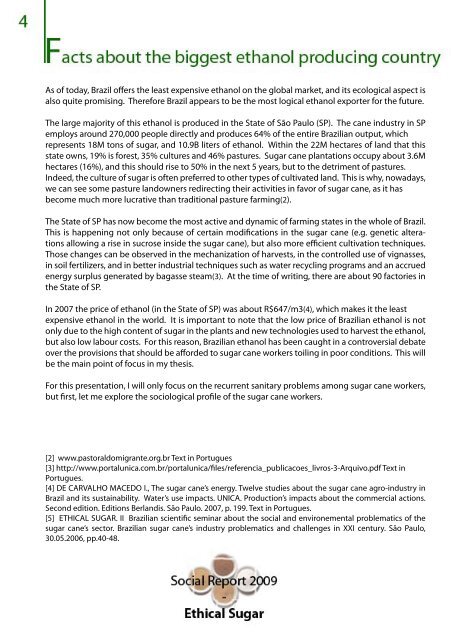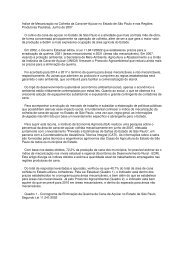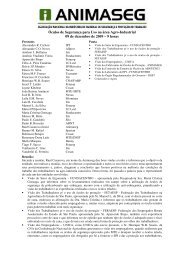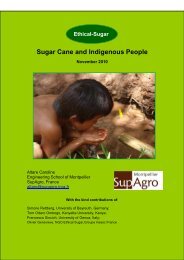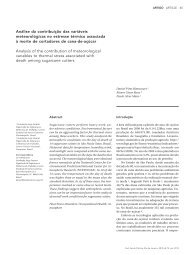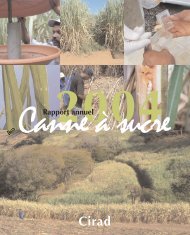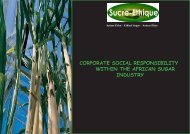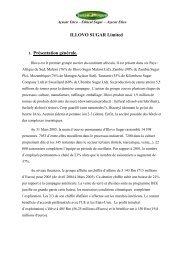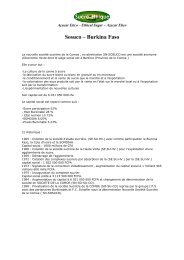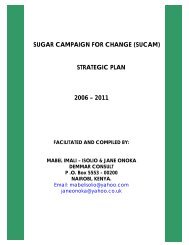Social Report Brazil 2009 - Sucre Ethique
Social Report Brazil 2009 - Sucre Ethique
Social Report Brazil 2009 - Sucre Ethique
You also want an ePaper? Increase the reach of your titles
YUMPU automatically turns print PDFs into web optimized ePapers that Google loves.
As of today, <strong>Brazil</strong> offers the least expensive ethanol on the global market, and its ecological aspect isalso quite promising. Therefore <strong>Brazil</strong> appears to be the most logical ethanol exporter for the future.The large majority of this ethanol is produced in the State of São Paulo (SP). The cane industry in SPemploys around 270,000 people directly and produces 64% of the entire <strong>Brazil</strong>ian output, whichrepresents 18M tons of sugar, and 10.9B liters of ethanol. Within the 22M hectares of land that thisstate owns, 19% is forest, 35% cultures and 46% pastures. Sugar cane plantations occupy about 3.6Mhectares (16%), and this should rise to 50% in the next 5 years, but to the detriment of pastures.Indeed, the culture of sugar is often preferred to other types of cultivated land. This is why, nowadays,we can see some pasture landowners redirecting their activities in favor of sugar cane, as it hasbecome much more lucrative than traditional pasture farming(2).The State of SP has now become the most active and dynamic of farming states in the whole of <strong>Brazil</strong>.This is happening not only because of certain modifications in the sugar cane (e.g. genetic alterationsallowing a rise in sucrose inside the sugar cane), but also more efficient cultivation techniques.Those changes can be observed in the mechanization of harvests, in the controlled use of vignasses,in soil fertilizers, and in better industrial techniques such as water recycling programs and an accruedenergy surplus generated by bagasse steam(3). At the time of writing, there are about 90 factories inthe State of SP.In 2007 the price of ethanol (in the State of SP) was about R$647/m3(4), which makes it the leastexpensive ethanol in the world. It is important to note that the low price of <strong>Brazil</strong>ian ethanol is notonly due to the high content of sugar in the plants and new technologies used to harvest the ethanol,but also low labour costs. For this reason, <strong>Brazil</strong>ian ethanol has been caught in a controversial debateover the provisions that should be afforded to sugar cane workers toiling in poor conditions. This willbe the main point of focus in my thesis.For this presentation, I will only focus on the recurrent sanitary problems among sugar cane workers,but first, let me explore the sociological profile of the sugar cane workers.[2] www.pastoraldomigrante.org.br Text in Portugues[3] http://www.portalunica.com.br/portalunica/files/referencia_publicacoes_livros-3-Arquivo.pdf Text inPortugues.[4] DE CARVALHO MACEDO I., The sugar cane’s energy. Twelve studies about the sugar cane agro-industry in<strong>Brazil</strong> and its sustainability. Water’s use impacts. UNICA. Production’s impacts about the commercial actions.Second edition. Editions Berlandis. São Paulo. 2007, p. 199. Text in Portugues.[5] ETHICAL SUGAR. II <strong>Brazil</strong>ian scientific seminar about the social and environemental problematics of thesugar cane’s sector. <strong>Brazil</strong>ian sugar cane’s industry problematics and challenges in XXI century. São Paulo,30.05.2006, pp.40-48.


